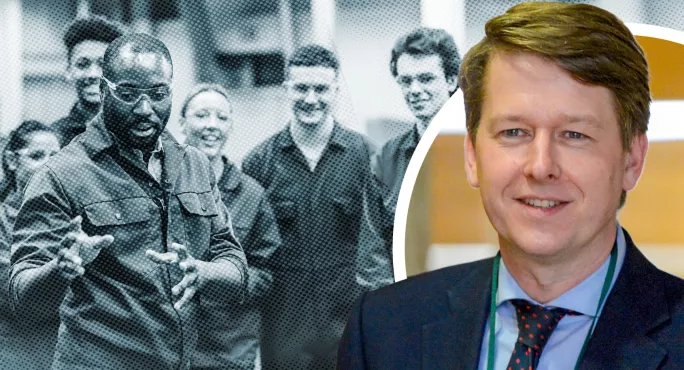Over the last few weeks, over a million students collected their GCSE and A-level results, not to mention T levels, completed college courses and finished apprenticeships.
It’s a huge moment in their lives where they take stock of what they want to do next.
But too many students leave the classroom doubtful of their career prospects.
Career concerns
Education is not just about making sure students do well within the school gates, it’s about making sure they are prepared to walk out of those gates with the confidence to go down the path that is right for them.
Yet, research from Teach First last week showed only around one-third of 16-to-18-year-olds feel confident they will work in their dream job, even less so among young people who are disadvantaged.
Those from the poorest backgrounds are twice as likely to feel pessimistic about their future career opportunities compared to their more affluent peers.
When the charity asked students about the support they received, less than half of those from the lowest-income backgrounds said their school was able to help them arrange work placements, compared to nearly two-thirds of those from the most well-off backgrounds.
Preparing students for the working world matters as much as exam results, and this data shows why this couldn’t be more important.
The good news is that a lot of work is already happening. This government has invested in developing a careers education system fit for the 21st century.
There is now a careers leader in every secondary school - a senior management position, making sure that life after education is firmly on every school’s agenda.
A law, supported by the Commons Education Select Committee, has been passed meaning every young person will meet apprenticeship and training providers.
Data from the national body for careers education shows that more and more businesses are partnering with schools and colleges in their area, too.
We need to go further
But, undoubtedly, ministers could go further.
As Harley, a young person in the North West, said to me during our inquiry into careers education earlier this year, in his area, there are lots of jobs in retail but his school just doesn’t have the links or connections to interesting and varied professions that broaden their horizons. This needs to change.
We need to see more funding to support schools where their careers programme is falling behind.
The government should pilot a programme funding more careers advisers so young people get direct, tailored support, linked to what the labour market in their local area actually looks like.
On top of this, careers education must be incorporated into the way we train our teachers, to ensure lessons from primary school to sixth form are taught in a way that brings the real-world relevance of subjects to life.
But more than this, we must make sure we are always attracting brilliant teachers into the profession, and keeping them, if we are to truly empower pupils.
The power of career aspirations
A great teacher can be the silver bullet who, day in, day out, opens the eyes of students to what they could do for the rest of their lives.
Nowhere is this more true than in schools serving the most deprived communities, which is where Teach First’s research shows young people are the least optimistic and where teacher recruitment and retention challenges bite the hardest.
As summer draws to a close, and schools come back to life in September, continuing to transform careers education and putting it at the centre of school life has to be a priority - not just for teachers and headteachers, but for the government, too.
Robin Walker is chair of the Commons Education Select Committee and former minister for school standards




